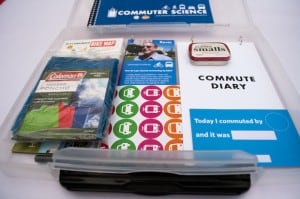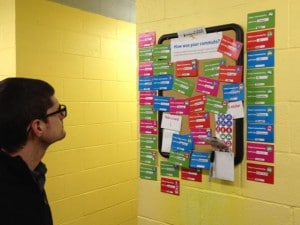Carnegie Mellon Grad Student and BikePGH team up to help commuters kick the drive alone habit
 Back in the Spring BikePGH was contacted by Carnegie Mellon graduate student Brett Leber from the School of Design. He was doing preliminary work on his thesis to explore how small-scale, design-enabled experimentation could lead to changes in commuting behavior. BikePGH was embarking on our fifth year of Car Free Fridays. We wanted to offer local employers more hands-on tools to encourage their staff to try alternatives to driving alone. We had a good idea of what we wanted to offer, but our capacity to explore how it would look was limited. The region lacks commuter choice programming, something akin to Smart Trips in other cities, where an agency assists employers and neighborhoods with tactical programming to encourage a mode shift.
Back in the Spring BikePGH was contacted by Carnegie Mellon graduate student Brett Leber from the School of Design. He was doing preliminary work on his thesis to explore how small-scale, design-enabled experimentation could lead to changes in commuting behavior. BikePGH was embarking on our fifth year of Car Free Fridays. We wanted to offer local employers more hands-on tools to encourage their staff to try alternatives to driving alone. We had a good idea of what we wanted to offer, but our capacity to explore how it would look was limited. The region lacks commuter choice programming, something akin to Smart Trips in other cities, where an agency assists employers and neighborhoods with tactical programming to encourage a mode shift.
A hand-holding approach that sets achievable goals
Brett found commuter choice a worthy thesis because he has observed that many people are interested in biking and transit, but the inertia of daily life can make it hard. Telling people that driving alone was expensive or had health consequences hasn’t proven effective so Brett set out to provide a gentle push to help people actually try something else, combined with some guidance and support.
Originally Brett was going to test his theory at Carnegie Mellon, but when he approached BikePGH about the idea we saw it as a perfect fit with Car Free Fridays. We were able to connect him with employers we felt were ready for this type of experimentation; organizations with staff members we knew would champion the effort that had supportive management. According to Brett, “[a] big challenge is getting the right mix of factors so that someone who is motivated will actually participate.” The timing has to be right for them and it helps a great deal if they’ve had an inclination to try something new, but haven’t been motivated enough to do it themselves . We found a ready partner with the Carnegie Science Center. Coincidentally Brett decided to call the project Commuter Science.
Commuter Science a new approach to commuter choice
 Commuter Science is distinct from other commuter choice programs in its approach by using a kit that includes a “commute diary” to sensitize participants to their routines; a journal that helps structure a multi-week experiment in commuting; and workshops and interviews. These methods, often used to inspire designers, are being used by Brett to inspire participants to reduce how often they drive alone to work. Commuter Science also strives to be a turnkey approach, one that is not resource intensive that a motivated employer could carry out on their own as long as an employee was able to dedicate time to organizing it.
Commuter Science is distinct from other commuter choice programs in its approach by using a kit that includes a “commute diary” to sensitize participants to their routines; a journal that helps structure a multi-week experiment in commuting; and workshops and interviews. These methods, often used to inspire designers, are being used by Brett to inspire participants to reduce how often they drive alone to work. Commuter Science also strives to be a turnkey approach, one that is not resource intensive that a motivated employer could carry out on their own as long as an employee was able to dedicate time to organizing it.
The pilot with the Carnegie Science Center proved to be really interesting. Their support and enthusiasm was critical. The opening workshop was spirited and fun. Those who participated seemed to really benefit from the experience. One highlight was the participation on a bulletin board Brett set up in a common space through the duration of the pilot. He prompted the staff at the Science Center to respond to the question “How was your commute?” and provided cards, markers, and stickers to solicit responses. The cards read “Today I commuted by ____ and it was ____”. The response was great, and some of the cards were quite funny.
At the conclusion of the pilot participants provided a lot of good feedback and appreciated the sense of community fostered by Commuter Science. Among the many insights shared, one participant noted, “I like how the program makes you think about your commute before you just instinctively hop in the car.”
Looking ahead
Brett would like to run the project again at the Science Center and to identify other organizations that might benefit from it. “For organizations that are willing to experiment with policy changes, we could learn a lot about how the combination of policy and this type of engagement affect commuter behavior.” Brett is also contemplating designing digital components to supplement the participant kit and activities, making it more social to learn how these things affect the experience.
Although BikePGH played a role in helping launch the pilot we are more interested in seeing a program like this reside at a public agency or other nonprofit whose mission it is to address commuter choice more broadly. BikePGH is able to contribute to the biking and pedestrian components, but the broader scope begs involvement from an agency with the capacity to support all modes. This is an opportunity for another organization to promote not only bicycling and walking, but transit and ride share too by providing that gentle push and support to help commuters make it happen.
 Not a member of BikePGH? Join today! We need you to add your voice! Bike Pittsburgh works to protect cyclist’s rights and promote the vision of making Pittsburgh a safer and more enjoyable place to live and to ride. For more info, check out: www.bikepgh.org/membership
Not a member of BikePGH? Join today! We need you to add your voice! Bike Pittsburgh works to protect cyclist’s rights and promote the vision of making Pittsburgh a safer and more enjoyable place to live and to ride. For more info, check out: www.bikepgh.org/membership